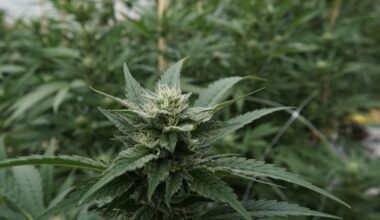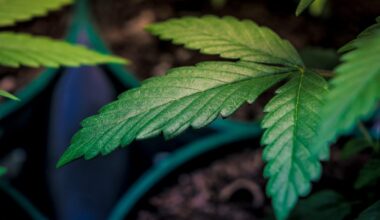A new law took effect in Minnesota on Friday that allows adults 21 and older to buy edibles infused with hemp-derived cannabinoids, including small amounts of THC.
The codification of the cannabis edibles policy through the legislation, which also imposes regulations on the sale of delta-8 THC products, in a state without a recreational marijuana law on the books is a novel development—and it’s one that’s led a key GOP senator to call for a rollback of the law even though he voted for it.
For reform supporters, the policy change is viewed as a solid step in the right direction, clarifying that adults can possess and consume hemp-based edibles and beverages that contain up to five milligrams of THC per serving, with a maximum 50 milligrams THC per package.
Five milligrams of THC is generally considered to be enough to give a person a moderate high, at least for infrequent consumers. But because products must also meet the state and federal definition of hemp, meaning they cannot contain more than 0.3 percent THC by dry weight, the overall amount of infused food someone in Minnesota might need to eat to feel the effects could be a bit larger than comparable products in state markets that don’t impose such THC limits on marijuana products.
The law, which Gov. Tim Walz (D) signed early last month, has generated some confusion. Senate Human Services Reform Finance and Policy Committee Chairman Jim Abeler (R), for example, said that he thought the bill only dealt with delta-8 THC regulations, and he suggested this week that the legislature should reverse course on the edible provisions.
But House Majority Leader Ryan Winkler (D), who has championed efforts to legalize adult-use marijuana in the state, told The Star Tribune that the Senate chair’s proposal to roll back the law was “ridiculous,” especially considering that Abeler voted in favor of the measure.
DFL House Majority Leader Ryan Winkler called Abeler’s request to roll the law back “ridiculous” and said Democrats have no interest in doing so. “He voted for it. He signed the conference report,” Winkler said. “This is a step forward towards a policy we strongly support.” https://t.co/5AiG0Gub3U
— Ryan Faircloth (@RyanFaircloth) June 30, 2022
“He voted for it. He signed the conference report,” Winkler said. “This is a step forward towards a policy we strongly support.”
Kurtis Hanna, a co-founder and contracted lobbyist with Minnesota NORML, told Marijuana Moment on Friday that the now-enacted legislation represents “a momentous occasion for us in Minnesota to be taking this slightly odd step forward.”
“I’m hoping that it will help alleviate concerns by people that have been nervous to move forward with adult-use cannabis,” he said. “Hopefully, we can get them to see the light that the sky isn’t going to fall and that we can move even further beyond what we have with this new law.”
—
Marijuana Moment is tracking more than 1,500 cannabis, psychedelics and drug policy bills in state legislatures and Congress this year. Patreon supporters pledging at least $25/month get access to our interactive maps, charts and hearing calendar so they don’t miss any developments.![]()
Learn more about our marijuana bill tracker and become a supporter on Patreon to get access.
—
Hanna said that he wouldn’t be surprised if the legislature revisits the issue and possibly make some “tweaks” to the policy next year, but even if Republicans were to take control of both chambers and the governorship, he doesn’t expect any serious effort to repeal the law and “pull back the liberties that have just been granted to Minnesotans.”
“The cat is out of the bag—and it’s not going back in,” he said.
There are other states without recreational marijuana laws where people can buy hemp edibles, but the regulatory space is murky and the federal Food and Drug Administration (FDA) currently does not have rules allowing for hemp to be marketed as food items or dietary supplements. That’s what makes Minnesota’s new law unique; by codifying and regulating hemp-based edibles, it’s taking a step to fill the state-federal policy gap.
Meanwhile, the state Board of Pharmacy released an FAQ on the new law on Thursday, explaining what is and isn’t allowed with respect to edible and non-edible hemp products.
Regulators emphasized that hemp topicals, tinctures and items meant to be inhaled cannot contain more than 0.3 percent THC. The same applies for cannabis edibles, it said, but there are separate rules in place for those products—namely the THC milligram requirements per serving and package.
Additionally, the board clarified that the 0.3 percent THC limit is holistic, applying to all isomers of the cannabinoid. So, for example, a serving of a cannabis edible can’t contain 5mg of delta-9 THC and 5mg of delta-8 THC; the limit applies to total THC.
The board also said on Friday that while it played a role in helping to draft the overall new cannabinoid law, the language on THC edibles was added at the “eleventh hour.”
The board did not object to it once it found out, however, as there were already many unregulated delta-8 THC products with higher doses on that being sold widely in Minnesota. “It got passed and we’re doing our best to support it.”
— Ryan Faircloth (@RyanFaircloth) July 1, 2022
The cannabis reform development in Minnesota is largely the result of an effort to permanently correct a legislative drafting problem that emerged after state lawmakers sought to align Minnesota’s hemp policy with that of the federal government.
The law further contains new testing, labeling and packaging requirements for hemp products.
Senate Minority Leader Melisa López Franzen (D) tried in May to advance broader legalization through a a procedural mechanism that would have required a supermajority of 41 votes to advance. But it failed, as expected. A House companion version did pass that full chamber last year.
Back in January, Winkler and López Franzen discussed their plans to advance the cannabis reform this session.
Winkler said at the time that his bill, which moved through 12 committees before being approved on the House floor last year, was the “product of hundreds of hours of work involving thousands of people’s input, countless hearings and public listening sessions.”
Separately, certain Democrats including staff for Winkler have found themselves caught up in a controversy over an alleged (and ultimately unsuccessful) attempt to change the name of a third party focused on marijuana that some have seen as undercutting Democratic support on the ballot in past cycles to one instead meant to appeal to far-right conservatives in an apparent attempt to siphon votes away from Republicans in the upcoming election.
For his part, the governor is supportive of marijuana legalization, and he included funding to implement the reform in his annual budget request to lawmakers in January.
While he declined to propose putting dollars toward implementation in his prior budget request, Walz said this year that he wants funding for multiple programs and departments to launch an adult-use marijuana market in line with the House-passed bill.
Previously, in 2019, the governor directed state agencies to prepare to implement reform in anticipation of legalization eventually passing.
While legalization wasn’t ultimately enacted following the House’s passage of the bill last year, the governor did sign a bill to expand the state’s medical marijuana program, in part by allowing patients to access smokable cannabis products.
A poll conducted by Minnesota lawmakers that was released last year found that 58 percent of residents are in favor of legalization. That’s a modest increase compared to the chamber’s 2019 survey, which showed 56 percent support.
The House majority leader said in 2020 that if Senate Republicans don’t go along with the policy change legislatively, he hopes they will at least let voters decide on cannabis as a 2022 ballot measure, but it does not seem that will happen this year.
Vermont Voters Overwhelmingly Support Drug Decriminalization, Across Party Lines, New Poll Finds
Photo courtesy of Flickr/jeffreyw.
Medical Disclaimer:
The information provided in these blog posts is intended for general informational and educational purposes only. It is not a substitute for professional medical advice, diagnosis, or treatment. Always seek the advice of your physician or other qualified healthcare provider with any questions you may have regarding a medical condition. The use of any information provided in these blog posts is solely at your own risk. The authors and the website do not recommend or endorse any specific products, treatments, or procedures mentioned. Reliance on any information in these blog posts is solely at your own discretion.







